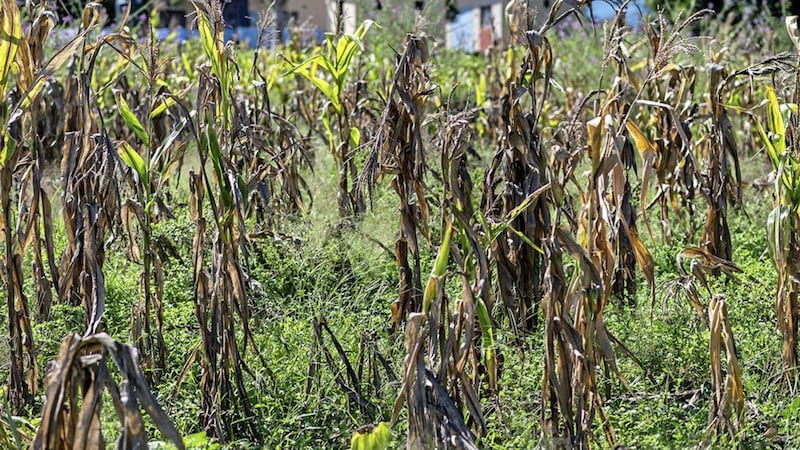THE man leading Trócaire’s aid efforts in Zimbabwe has warned of the impact the Ukraine conflict and rising prices is having on food security around the world.
Peter McGeachie is the country director in Zimbabwe for the Irish overseas development agency.
Originally from Ayrshire, he has spent over three decades working in some of the world’s poorest countries including Mozambique, Nepal, Myanmar and Pakistan.
Now based in Harare, he said the local population’s struggle with Covid-19 and the effects of climate change has become “significantly worse” in recent weeks due to the global rise in food prices.
“Most people in Zimbabwe depend on rain-fed agriculture to feed their families,” said the 62-year-old.
“It’s coming to the end of the rainy season and unfortunately the rains have failed in many places.
“The growing season was looking quite good, but then there were poor rains in January and February and that changed everything. Instead of fields full of maize and other crops ready to be harvested, there are vast swathes of stunted or dead plants.
“I have spoken to farmers in the rural areas of Zimbabwe. Life is a daily struggle for them and they have told me they estimate they will lose much of their harvest this year, meaning critical food shortages and lack of income for their communities in the coming months.”
He said: “Coupled with this poor harvest is the effect of rising food prices.
“As in many countries around the world, the war in Ukraine has seen the price of food and fuel sky-rocket in Zimbabwe in recent weeks. Inflation rates continue to spiral upwards.”
Ukraine normally produces enough food to feed 400 million people, but the abrupt halt to its exports has contributed to higher prices for flour, maize and cooking oil.
UN agency, the World Food Program (WFP), estimates that some 5.3 million Zimbabweans – around a third of the population - are food insecure.
Mr McGeachie said Tr?caire is working with communities in Zimbabwe to try to ensure that they are able to survive these latest shocks.
The agency has backed a number of innovative food projects, including the 'Mopane Worm’ initiative. The large edible caterpillars are seen as a delicacy and a good source of protein.
Trócaire has also helped fund community gardens with solar water pumps where people can grow vegetables, and seed banks, which provide drought-resistant seeds. It's also supporting agricultural training in more sustainable farming methods and savings and loan schemes.
“Covid-19 and the Ukraine conflict have only added to the problems already faced by seven million people in southern Zimbabwe, especially women, hit with drought caused by climate change," said Mr McGeachie.
“The Tr?caire Lenten Appeal this year is putting the spotlight on Zimbabwe.”
He said the efforts have been assisted with up to £2 million from the UK Government under the aid match scheme, which matches pound for pound donations made to Trócaire during the latest lenten campaign.
“With this extra funding we aim to give 26,000 Zimbabweans safe water and help them to grow their own food,” said the aid worker.
“Things are bad in Zimbabwe and the coming months are going to be extremely difficult for the people here. But donations to the Lenten Appeal will enable Tr?caire to continue supporting people in their time of need and provide hope where previously there was very little.
“This is having a profound impact on people who already had very little disposable income,” he said.
“Now everything is costing more – vegetable oil that people cook with, salt, soap, sugar, batteries and candles.
“The little money people have will have to be spent on food. They don’t know how they will pay their children’s school fees and fear they will be sent home if they can’t pay.”
Commenting on the government aid match scheme, the UK's Minister for Africa, Vicky Ford said: “The UK Government is delighted that through UK Aid Match, we will again be doubling generous donations from the public, to support Trocaire’s valuable work.
“With your support, Trócaire will provide life-saving help for Zimbabwean families facing hunger through drought, climate change and a food security crisis exacerbated by Russia’s barbaric invasion stealing food from the mouths of the world’s poorest people.”
To donate to Trócaire, visit trocaire.org/donations/now








